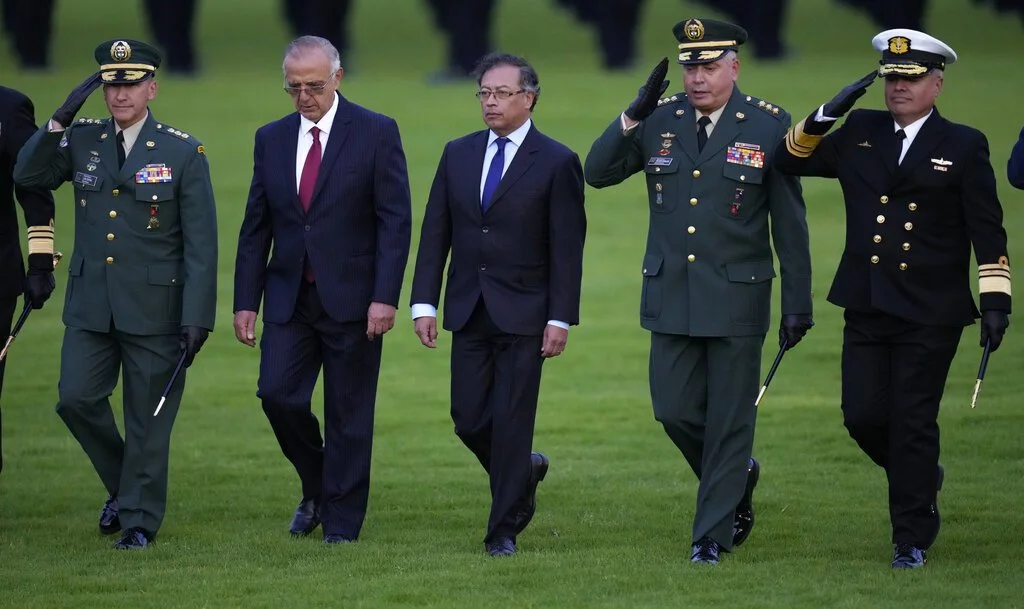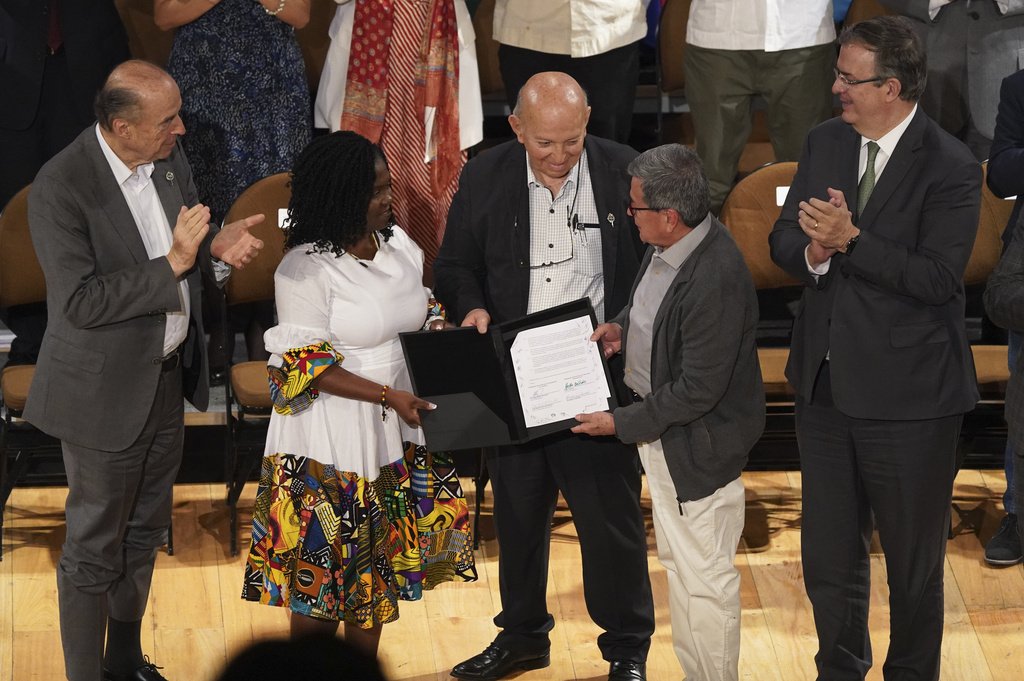Colombian Rebel Guerilla Kills Nine Soldiers in Bomb Attack
Colombian President Gustavo Petro with the Defense Minister and other armed forces generals. Photo: AP/Fernando Vergara
On Wednesday, Mar. 29, the far-left Colombian guerilla group known as the National Liberation Army (ELN) allegedly attacked an army base in the Norte de Santander department, near Venezuela, killing nine soldiers and seriously compromising ongoing peace negotiations with President Petro's administration.
The commander of Colombia's military, Maj. Gen. Helder Giraldo Bonilla, said that seven of those killed were fulfilling conscription duties and two were non-commissioned officers. Another nine wounded soldiers had to be hospitalized.
The military unit was struck while securing the northern Caño Limón-Coveñas pipeline of state oil company Ecopetrol. According to Bonilla, the soldiers onsite were not involved in offensive operations.
ELN forces have targeted Ecopetrol facilities multiple times in the past. The leaders of the rebel group have previously expressed disapproval of the government's management of oil resources, using the attacks in other instances as a way to demand adjustments in fuel costs and the elimination of road tolls.
The assault on military personnel represents a major setback for Petro's plan to bring "total peace" to Colombia. After a historic peace deal in 2016 with the Revolutionary Armed Forces of Colombia (FARC), the ELN became the largest remaining rebel group in the country.
Petro's right-wing predecessor, Iván Duque Márquez suspended peace talks with the ELN after the organization bombed a police academy in Bogotá in 2019, killing 22 people.
Petro, himself a former guerilla member of the now-demobilized M-19 group, resumed negotiations with the ELN leadership after taking office at the end of 2022, pledging to end the remaining conflicts.
Only three weeks ago, on Mar. 10, Colombia's government and the radical left-wing rebels met in Mexico City for a second round of negotiations. Both Pablo Beltrán, the head of the ELN delegation, and Otty Patiño, the head of the government delegation, foreshadowed the possibility of an imminent ceasefire. However, the attack this Wednesday suggests that the guerilla group is likely not satisfied with the terms of the ceasefire.
Colombia's Vice President Francia Márquez, José Otty Patiño and Pablo Beltrán hold the peace accords signed at the end of the second round of peace negotiations in Mexico City, Mar. 10, 2023. Photo AP/Marco Ugarte
A few hours after the events unfolded in Norte de Santander, Petro called the government's peace delegation and representatives of guarantor countries for consultation. Patiño said in a statement that he would advise Petro to make the peace deal a priority. In addition to the attack, Patiño highlighted that the ELN has been increasing hostilities against civilians in the departments of Cauca, Arauca, Chocó and Nariño, engaging in a “flagrant violation of the norms of international humanitarian law that they claim to abide by.”
The ELN has been operating since 1964, and today, it is assumed to comprise between 2,000 and 4,000 troops. Human rights organizations have reported that the guerilla runs illegal mining operations and vital drug trafficking routes.
Colombia's Truth Commission released a final report in 2022 that indicates that the war between the Colombian government, rebel groups like the ELN, paramilitaries, and drug cartels caused 450,664 deaths and 121,768 disappearances between 1985 and 2018. According to the United Nations High Commissioner for Refugees (UNHCR), the violence in Colombia has left 6.7 million people internally displaced, with another 500,000 to 750,000 seeking refuge abroad.
As journalist Juan Diego Quesada writes in El País, without a peace agreement with the ELN, there is no prospect of "total peace" in Colombia. The longer the tension and the conflict extends between all these actors heretofore mentioned, the more civilians are at risk of being displaced or getting caught in the violence between them.
With many neighboring countries like Venezuela grappling with their own internal turmoil, there are very few safe havens wherein to seek refuge.


